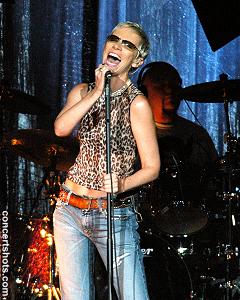What an intriguing pairing of ‘80s icons! Both
artists retain a barrier-pushing edge even as they slide through the usually art-killing
middle age doldrums and their solo careers have both been spotty since they left their
seminal bands. Sting and Annie Lennox are the perfect musical match.

|
Annie started off a bit uneven. Songs like “Have Mercy” and
“No Turning Back” came across as half-hearted attempts at blue-eyed soul. Not
even the hit “No More I Love You’s” could spark that much interest in the
crowd. That all changed after a palate-cleaning gospel version of Eurythmics’ “Here
Comes The Rain Again.” Lennox sat a piano for the sparse solo performance. After
that, the show took on a more relaxed and dynamic feel. The audience joined in on “Walking
On Broken Glass,” adding their hand claps to the percussive sway of the tune. Then it
happened: that defining, transitional moment that turns an okay show into a great one.
Over a wailing electric guitar, Annie began emoting. Back into gospel mode, but this time
firmly entrenched in the gospel that was eventually bastardized into rock and roll, she
led her band through a razor sharp take on “Missionary Man” that left no doubts
as to whether she still had the power of yore. To underscore it, this monster segued into
an equally stunning “I Need A Man.” The double shot found the crowd finally on
its feet. A vastly reworked and muscular “Sweet Dreams” followed. The airy synth
lines were replaced with distortion and swagger but all the pulsing groove remained. As a
final statement, she chose “Why.” This time, she fully transformed into the diva
that she hinted at early in the evening. The passion and frustration of human connection
and disconnection was all wrapped up in the soaring but subtle voice and soul of Annie
Lennox. Following a plea to the audience to give to a children’s charity, she was
gone. |